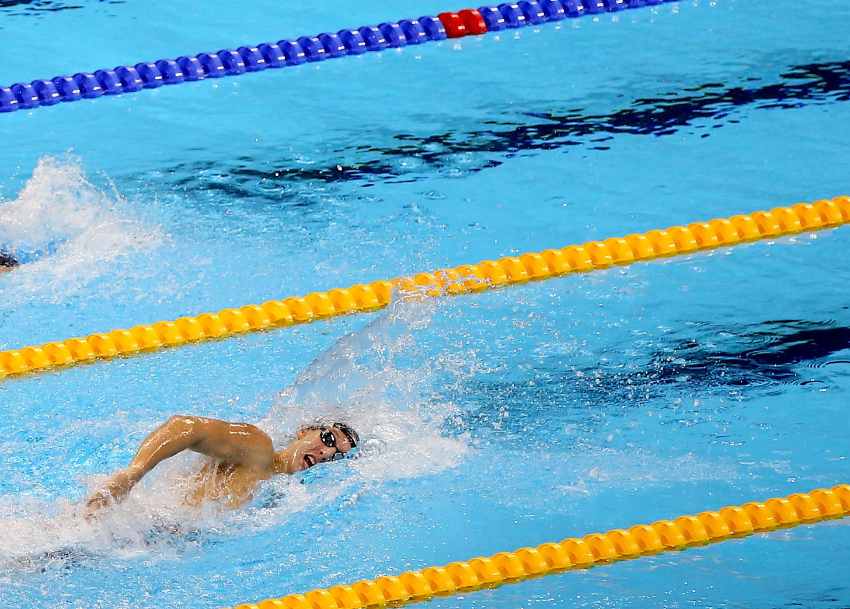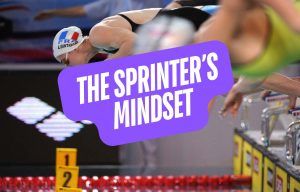Ah yes, the Big Goal.
You know—that pesky personal best time, making the national team, winning an Olympic gold medal.
The Big Goal continually runs in the back of your mind like an app on your smartphone.
And like the pages of code required to keep an app functioning properly, we imagine the Big Goal requires a long, complex routine.
After all, because it’s big achieving it requires a super, mega complicated plan.
But this is typically not the best way for chasing awesomeness in the water.
Here’s why simple is better when it comes to your Big Goal.
? Why We Love Big, Super Complicated Goals
Every time I set about a new goal (or pulling an old goal out of the dustbin), it’s the same story.
The first instinct is for my brain to figure out the thousand things I need to do in order to achieve it.
As an age group swimmer, it would look like this:
- Wake up extra early before morning practice and foam roll.
- Stay after practice for an additional 15 minutes to work on core strength.
- Do 5 kicks off every wall for every push-off.
- Write goals for the practice before getting in the water.
- Do an extra 15 dives after practice.
- Drink a protein shake after every workout.
- Spend ten minutes reviewing your practice before bed.
- Meal prep all your meals.
- Video review technique every Friday afternoon.
And so on.
Impressive, right?
(Impressiveness is one of the reasons we tend to engage in complexity bias—making things more complicated than necessary.)
This spectacular routine would last about a day or two before a task would get missed and the routine would fall apart.
Frustrated, I’d drop my swim goggles in my bag, sag the shoulders, and after a week or had passed, I’d recycle the same approach.
Even though I was not sticking to this big and complex routine, I kept drifting back to this pattern.
Why?
For several reasons:
✔️ Complex plans are super exciting.
Writing out a big list of things that will improve my swimming is fun.
Exciting.
White-knuckles on the roller-coaster handle type of fun.
Even writing out that list above kinda got me pumped up.
Writing a simple, short list of things to focus on each day, on the other hand… kind of dull.
✔️ It was super challenging.
In order to accomplish big things in the water, I always assumed it was necessary to push myself to the breaking point each day with my process and routine.
Big Goals require Herculean levels of effort and focus, right?
The more challenging the routine, the faster I would get to my goals.
✔️ Mysterious.
Finally, I suspect introducing this level of complexity was also self-sabotage.
I was giving myself a way out in the event of failure by building up my goal and the journey to get there by making it mythical and mysterious.
By imagining the solution to be grander and more complex than it is, I had a parachute for when things didn’t go my way.
But while a big and complex process was exciting (while making it, at least), there were some downsides:
❌ Almost guaranteed to fail.
Complexity has a lot of moving parts.
And the more moving parts you have, the more things can go wrong.
❌ Stressful.
You are always “on”, running from task to task.
Sustaining this kind of effort and focus is draining and robs you of the time and space to recover and replenish.
And because there are so many things to do, so many variables at play, it’s hard for our brain to keep things ordered, making us feel even more stressed out.
❌ Equates the same value to unequal actions.
Complexity usually ends up assigning similar value to things that aren’t similar in value.
Stretching for ten minutes after practice is obviously important, but is it as important as giving an excellent effort in the water?
Drinking a glass of water when you wake-up is clearly important, but is it as important as making every practice this week?
Complexity often muddies the water with all the things we need to do, lending equal weight to tasks and objectives that do not provide equal output.
❌ Shiny New Thing Syndrome.
Complexity is a great way to keep ourselves interested (not necessarily a bad thing, obviously) by introducing new shiny things to focus on that ultimately distract us from the core process of what it takes to be successful in the water.
Jumping from new thing to new thing gets old as it reduces the sustained effort we apply to improving.
? Focus on the Basics (and the Results Will Take Care of Themselves)
So knowing that complex plans aren’t always the best route to take, what do we do to make sure that we stay focused on the things that matter?
⭐ Keep a simple process.
One of the first pieces of advice I give to swimmers is to list the 3-5 things they could do every day that would help them get to their goals, that they control, and that can sustain.
Things like:
- Show up to practice 15 minutes early to stretch and warm-up
- Eat a healthy dinner
- Give an effort of 8.5/10 or better at practice
- Write out my swim practice when I get home
I know—these things don’t seem like they would drive otherworldly results in the pool.
But it establishes a doable baseline that will infect the rest of your swimming with excellence.
It’s a continuous battle to keep complexity from jumping on the page with this exercise, but it’s super worth writing these things down and keeping them visible for days where the shadow of complexity creeps in.
⭐ Focus on the fundamentals.
The path to your goals is always going to be simpler than you think.
Looking back on the times you achieved success in the water, was it by overcomplicating things?
Or was it by focusing on a couple of key aspects of your swimming and doing them really, really well?
The fundamentals never go out of style in the water.
⭐ Be honest about what works for you.
Having a process or routine that works for you is crucial.
It’s tempting to copy what others do, but you know yourself best.
Even if your individual routine isn’t the prettiest, if it works for you, use it!
⭐ Strike a balance.
Complexity is exciting. There’s no doubt.
And as you become more of an expert in the pool, as your speed and skill increase, you will be able to tackle more complicated goals and processes.
Finding the balance is crucial.
If you find yourself stuck in the mud, not moving forward with your goals, step back and ask if you are overcomplicating things and avoiding the simple stuff.
“Simplicity is a great virtue but it requires hard work to achieve it and education to appreciate it. And to make matters worse: complexity sells better.” — Edsger W. Dijkstra
“The ability to simplify means to eliminate the unnecessary so that the necessary may speak.” – Hans Hoffman
More Articles Like This
This Mental Training Workbook Will Help You Swim Like a Rock Star This Season. Confused about mental training? Want to unleash pro mode on your swimming this year? Learn how this mental training workbook will change your mindset and help you pummel your PB’s this season.
Why Change is So Hard in the Pool (and How to Make It Easier). We all want change in some measure—so why is it so dang difficult to make happen? Here’s the reality behind making change that actually sticks in the pool.












